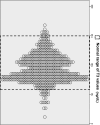Low Triiodothyronine Syndrome and Long-Term Cardiovascular Outcome in Incident Peritoneal Dialysis Patients
- PMID: 25979970
- PMCID: PMC4455199
- DOI: 10.2215/CJN.03350414
Low Triiodothyronine Syndrome and Long-Term Cardiovascular Outcome in Incident Peritoneal Dialysis Patients
Abstract
Background and objectives: A direct association between low triiodothyronine (T3) syndrome and cardiovascular (CV) mortality has been reported in hemodialysis patients. However, the implications of this syndrome in peritoneal dialysis (PD) patients have not been properly investigated. This study examined the association between low T3 syndrome and CV mortality including sudden death in a large cohort of incident PD patients.
Design, setting, participants, & measurements: This prospective observational study included 447 euthyroid patients who started PD between January 2000 and December 2009. Measurement of thyroid hormones was performed at baseline. All-cause and cause-specific deaths were registered during the median 46 months of follow-up. The survival rate was compared among three groups based on tertile of T3 levels.
Results: In Kaplan-Meyer analysis, patients with the lowest tertile were significantly associated with higher risk of all-cause and CV mortality including sudden death (P<0.001 for trend). In Cox analyses, T3 level was a significant predictor of all-cause mortality (per 10-unit increase, adjusted hazard ratio [HR], 0.86; 95% confidence interval [95% CI], 0.78 to 0.94; P=0.002), CV death (per 10-unit increase, adjusted HR, 0.84; 95% CI, 0.75 to 0.98; P=0.01), and sudden death (per 10-unit increase, adjusted HR, 0.69; 95% CI, 0.56 to 0.86; P=0.001) after adjusting for well known risk factors including inflammation and malnutrition. The higher T3 level was also independently associated with lower risk for sudden death (per 10-unit increase, adjusted HR, 0.71; 95% CI, 0.56 to 0.90; P=0.01) even when accounting for competing risks of death from other causes.
Conclusions: T3 level at the initiation of PD was a strong independent predictor of long-term CV mortality, particularly sudden death, even after adjusting well known risk factors. Low T3 syndrome might represent a factor directly implicated in cardiac complications in PD patients.
Keywords: cardiovascular; mortality; peritoneal dialysis.
Copyright © 2015 by the American Society of Nephrology.
Figures



Comment in
-
Low-T3 Syndrome in Peritoneal Dialysis: Metabolic Adaptation, Marker of Illness, or Mortality Mediator?Clin J Am Soc Nephrol. 2015 Jun 5;10(6):917-9. doi: 10.2215/CJN.04310415. Epub 2015 May 15. Clin J Am Soc Nephrol. 2015. PMID: 25979973 Free PMC article. No abstract available.
References
-
- Lim VS: Thyroid function in patients with chronic renal failure. Am J Kidney Dis 38[Suppl 1]: S80–S84, 2001 - PubMed
-
- Warner MH, Beckett GJ: Mechanisms behind the non-thyroidal illness syndrome: An update. J Endocrinol 205: 1–13, 2010 - PubMed
-
- Meuwese CL, Dekkers OM, Stenvinkel P, Dekker FW, Carrero JJ: Nonthyroidal illness and the cardiorenal syndrome. Nat Rev Nephrol 9: 599–609, 2013 - PubMed
-
- Iglesias P, Díez JJ: Thyroid dysfunction and kidney disease. Eur J Endocrinol 160: 503–515, 2009 - PubMed
-
- Song SH, Kwak IS, Lee DW, Kang YH, Seong EY, Park JS: The prevalence of low triiodothyronine according to the stage of chronic kidney disease in subjects with a normal thyroid-stimulating hormone. Nephrol Dial Transplant 24: 1534–1538, 2009 - PubMed
Publication types
MeSH terms
Substances
LinkOut - more resources
Full Text Sources
Medical

